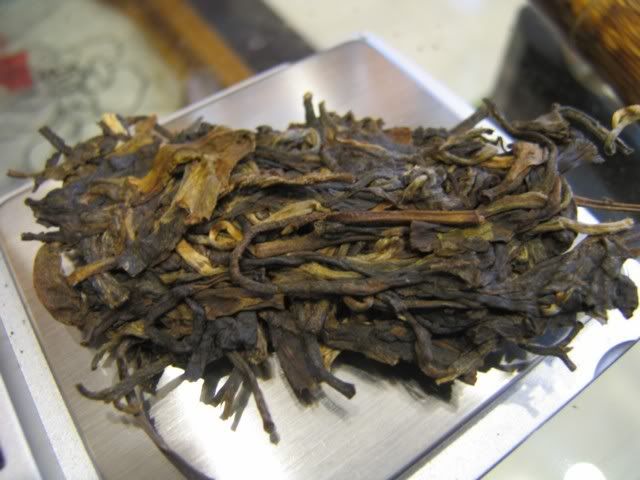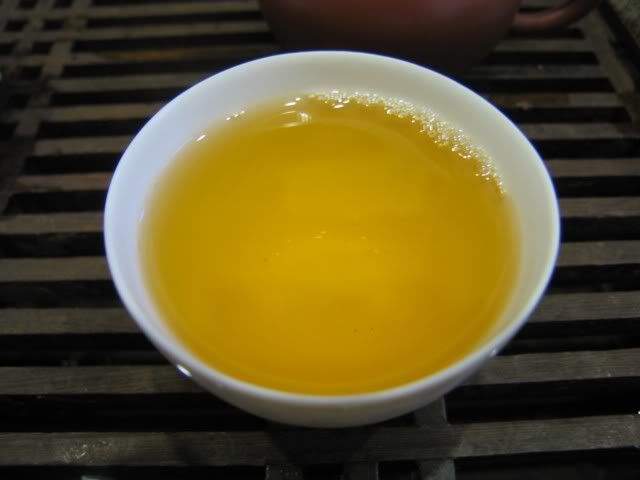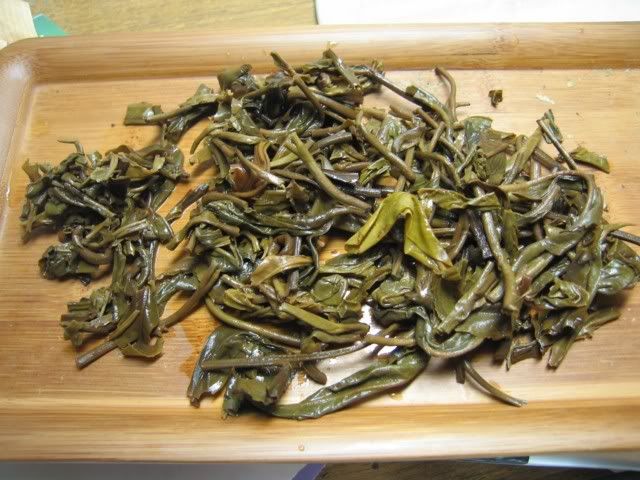I went back to this sample – what’s left of it – today.
One thing about these teas is that they are stemmy — lots of stems

Stems are not a bad thing. In fact, some see it as an important part of a cake that will age well. Obviously Mr. Chen agrees.
It brews bright yellow

The tea is smooth (as young raw pureh goes), sweet, classic Yiwu taste, clean, deep, strong qi… the only thing I had a problem with was that it dropped off significantly after about 7. There was a steep drop off into another step — something much milder and sweeter, and it is on that plane that it remains. It still brews infusions after that, just… it’s a bit of a jarring turn.


One thing I’ve noticed about this after brewing it is that the leaves don’t unfurl on their own. Now, there are people out there who will claim that leaves that don’t unfurl is a sign of a bad tea, but I think that really only applies to aged stuff or highly roasted stuff. Here, the leaves are sticking onto each other (or themselves — rolled) and don’t unfurl despite long brew times. You need to peel them open. Is this good, or is this bad?
There’s a recent post on tea4u, a Taiwanese forum, that sums up all these debates – basically, the simple answer is “nobody really knows”. Everybody agreed that “it’s better to spend more on a good tea than to pay less for a crap tea”. Ok, that’s easy. The next question is — what’s a good tea?
That’s where everybody starts getting stumped. Keep in mind these are collectors, dealers, that sort of thing. People who are hardly unknowledgable about tea. People who are widely read, have drank lots, etc… and most couldn’t come up with a straight answer. When somebody proposes something, someone else will challenge it. My conclusion from all this is that — there is no concensus, and if you talk to 100 “experts”, you’ll get 100 different answers. The simple way of explaining this? Nobody really knows.
So we’re basically all guessing, and none of these newer cakes really have had enough time to mature into something truly aged yet. We’ve been doing this for, what, 10 years, since the mid 90s? All the new experiments are just now entering the second decade… whether somebody’s right or not will take considerably longer to figure out.
I guess one way to ensure you have a nice cake for the future is to hedge your bets — buy different styles of stuff, preferably from different kinds of people who believe in different kinds of aging formula. Or… just not worry too much and go with the flow, drink what you feel makes you happy. I’m somehow more comfortable with that approach, but just in case, I’m also practicing a bit of the first as well to hedge my own bets 🙂

3 responses so far ↓
iwii // October 29, 2007 at 3:53 am |
The CGHT cakes I encountered were heavily rolled. Perhaps this accounts too for the fact the leaves are not unfurling easily.
However the leaves should always be flexible even if they are not unfurling on their own. But for some odd reason I am always surprised when the leaves do not unfurl… probably a matter of habits since most of the young teas I tried were not as heavily rolled.
Maybe we can draw a parallell with oolongs here. Do fisted oolong age better than non rolled ones? I honestly haven’t got a clue, but maybe you do?
behhl // October 29, 2007 at 10:51 am |
Am wondering if longevity of brewing improves with aging rather than anything else? Is that what you find too … or do you recall any ‘good’ young puerhs that have a outstanding stamina? Plumbing around in my shallow experience but I can only recall that most young puerhs trail off quick(er) and especially if happened to overbrew it once or twice in the sequence (not that I am saying you did).
Just simply wondering if you are holding the standard a bit too high, as well it may be that on some other day brewing may find this drop off not to be the case. This is the devil with limited samples – I kinda of figure that you don’t really know a tea until you brewed it several times several ways to ‘bust its chops’. This is the wonderful thing of gongfu cha! Caveat is I never tried this particular tea, so I am just talking through my vitual nose in high theory!
MarshalN // October 29, 2007 at 11:09 am |
Yes, I think longevity does improve with age — perhaps the breaking down of the structure of the leaf releasing more stuff to brew?
I totally agree — the first time you brew a tea it can be a bad experience simply because you misjudged the character of the tea. I’ve revised my opinion on some teas after a second try before, and I’m sure I’ll do it again in the future 🙂